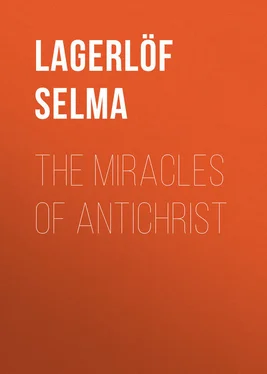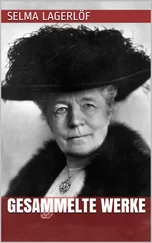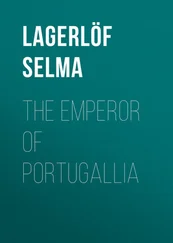Selma Lagerlöf - The Miracles of Antichrist
Здесь есть возможность читать онлайн «Selma Lagerlöf - The Miracles of Antichrist» — ознакомительный отрывок электронной книги совершенно бесплатно, а после прочтения отрывка купить полную версию. В некоторых случаях можно слушать аудио, скачать через торрент в формате fb2 и присутствует краткое содержание. Жанр: foreign_antique, foreign_prose, на английском языке. Описание произведения, (предисловие) а так же отзывы посетителей доступны на портале библиотеки ЛибКат.
- Название:The Miracles of Antichrist
- Автор:
- Жанр:
- Год:неизвестен
- ISBN:нет данных
- Рейтинг книги:4 / 5. Голосов: 1
-
Избранное:Добавить в избранное
- Отзывы:
-
Ваша оценка:
- 80
- 1
- 2
- 3
- 4
- 5
The Miracles of Antichrist: краткое содержание, описание и аннотация
Предлагаем к чтению аннотацию, описание, краткое содержание или предисловие (зависит от того, что написал сам автор книги «The Miracles of Antichrist»). Если вы не нашли необходимую информацию о книге — напишите в комментариях, мы постараемся отыскать её.
The Miracles of Antichrist — читать онлайн ознакомительный отрывок
Ниже представлен текст книги, разбитый по страницам. Система сохранения места последней прочитанной страницы, позволяет с удобством читать онлайн бесплатно книгу «The Miracles of Antichrist», без необходимости каждый раз заново искать на чём Вы остановились. Поставьте закладку, и сможете в любой момент перейти на страницу, на которой закончили чтение.
Интервал:
Закладка:
But poor Giannita never got a chance to speak; as soon as she began, the signorina became frightened and interrupted her. She told her story as if to induce Giannita not to be too hard to her.
Giannita must not think that her unhappiness only came from the fact of her no longer having her carriage, or a box at the theatre, or beautiful dresses, or servants, or even a roof over her head. Neither was it enough that she had now lost all her friends, so that she did not at all know where she should ask for shelter. Neither was it misfortune enough that she felt such shame that she could not raise her eyes to any one’s face.
But there was something else much worse.
She sat down, and was silent a moment, while she rocked to and fro in agony. But when Giannita began to speak, she interrupted her.
Giannita could not think how her father had loved her. He had always had her live in splendor and magnificence, like a princess.
She had not done much for him; only let him think out delightful things to amuse her. It had been no sacrifice to remain unmarried, for she had never loved any one like her father, and her own home had been finer than any one else’s.
But one day her father had come and said to her, “They wish to arrest me. They are spreading the report that I have stolen, but it is not true.” Then she had believed him, and helped him to hide from the Carabinieri . And they had looked for him in vain in Catania, on Etna, over the whole of Sicily.
But when the police could not find Cavaliere Palmeri, the people began to say: “He is a fine gentleman, and they are fine gentlemen who help him; otherwise they would have found him long ago.” And the prefect in Catania had come to her. She received him smiling, and the prefect came as if to talk of roses, and the beautiful weather. Then he said: “Will the signorina look at this little paper? Will the signorina read this little letter? Will the signorina observe this little signature?” She read and read. And what did she see? Her father was not innocent. Her father had taken the money of others.
When the prefect had left her, she had gone to her father. “You are guilty,” she said to him. “You may do what you will, but I cannot help you any more.” Oh, she had not known what she said! She had always been very proud. She had not been able to bear to have their name stamped with dishonor. She had wished for a moment that her father had been dead, rather than that this had happened to her. Perhaps she had also said it to him. She did not rightly know what she had said.
But after that God had forsaken her. The most terrible things had happened. Her father had taken her at her word. He had gone and given himself up. And ever since he had been in prison he had not been willing to see her. He did not answer her letters, and the food that she sent him he sent back untouched. That was the most dreadful thing of all. He seemed to think that she wished to kill him.
She looked at Giannita as anxiously as if she awaited her sentence of death.
“Why do you not say to me what you have to say?” she exclaimed. “You are killing me!”
But it was impossible for her to force herself to be silent.
“You must know,” she continued, “that this palace is sold, and the purchaser has let it to an English lady, who is to move in to-day. Some of her things were brought in already yesterday, and among them was a little image of Christ.
“I caught sight of it as I passed through the vestibule, Giannita. They had taken it out of a trunk, and it lay there on the floor. It had been so neglected that no one took any trouble about it. Its crown was dented, and its dress dirty, and all the small ornaments which adorned it were rusty and broken. But when I saw it lying on the floor, I took it up and carried it into the room and placed it on a table. And while I did so, it occurred to me that I would ask its help. I knelt down before it and prayed a long time. ‘Help me in my great need!’ I said to the Christchild.
“While I prayed, it seemed to me that the image wished to answer me. I lifted my head, and the child stood there as dull as before, but a clock began to strike just then. It struck four, and it was as if it had said four words. It was as if the Christchild had answered a fourfold yes to my prayer.
“That gave me courage, Giannita, so that to-day I drove to the Palace of Justice to see my father. But he never turned his eyes toward me during the whole time he stood before his judges.
“I waited until they were about to lead him away, and threw myself on my knees before him in one of the narrow passages. Giannita, he let the soldiers lead me away without giving me a word.
“So, you see, God hates me. When I heard you speak of yesterday afternoon at four o’clock, I was so frightened. The Christchild sends me a new misfortune, I thought. It hates me for having failed my father.”
When she had said that, she was at last silent and listened breathlessly for what Giannita should say.
And Giannita told her story to her.
“See, see, is it not wonderful?” she said at the end. “I have not been in Catania for twelve years, and then I come here quite unexpectedly. And I know nothing at all; but as soon as I set my foot on the street here, I hear your misfortune. God has sent a message to me, I said to myself. He has called me here to help my god-sister.”
Signorina Palmeri’s eyes were turned anxiously questioning towards her. Now the new blow was coming. She gathered all her courage to meet it.
“What do you wish me to do for you, god-sister?” said Giannita. “Do you know what I thought as I was walking through the streets? I will ask her if she will go with me to Diamante, I thought. I know an old house there, where we could live cheaply. And I would embroider and sew, so that we could support ourselves. When I was out in the street I thought that it might be, but now I understand that it is impossible, impossible. You require something more of life; but tell me if I can do anything for you. You shall not thrust me away, for God has sent me.”
The signorina bent towards Giannita. “Well?” she said anxiously.
“You shall let me do what I can for you, for I love you,” said Giannita, and fell on her knees and put her arms about her.
“Have you nothing else to say?” asked the signorina.
“I wish I had,” said Giannita, “but I am only a poor girl.”
It was wonderful to see how the features of the young signorina’s face softened; how her color came back and how her eyes began to shine. Now it was plain that she had great beauty.
“Giannita,” she said, low and scarcely audibly, “do you think that it is a miracle? Do you think that God can let a miracle come to pass for my sake?”
“Yes, yes,” whispered Giannita back.
“I prayed the Christchild that he should help me, and he sends you to me. Do you think that it was the Christchild who sent you, Giannita?”
“Yes, it was; it was!”
“Then God has not forsaken me, Giannita?”
“No, God has not forsaken you.”
The god-sisters sat and wept for a while. It was quite quiet in the room. “When you came, Giannita, I thought that nothing was left me but to kill myself,” she said at last. “I did not know where to turn, and God hated me.”
“But tell me now what I can do for you, god-sister,” said Giannita.
As an answer the other drew her to her and kissed her.
“But it is enough that you are sent by the little Christchild,” she said. “It is enough that I know that God has not forsaken me.”
IV
DIAMANTE
Micaela Palmeri was on her way to Diamante with Giannita.
They had taken their places in the post-carriage at three o’clock in the morning, and had driven up the beautiful road over the lower slopes of Etna, circling round the mountain. But it had been quite dark. They had not seen anything of the surrounding country.
Читать дальшеИнтервал:
Закладка:
Похожие книги на «The Miracles of Antichrist»
Представляем Вашему вниманию похожие книги на «The Miracles of Antichrist» списком для выбора. Мы отобрали схожую по названию и смыслу литературу в надежде предоставить читателям больше вариантов отыскать новые, интересные, ещё непрочитанные произведения.
Обсуждение, отзывы о книге «The Miracles of Antichrist» и просто собственные мнения читателей. Оставьте ваши комментарии, напишите, что Вы думаете о произведении, его смысле или главных героях. Укажите что конкретно понравилось, а что нет, и почему Вы так считаете.












